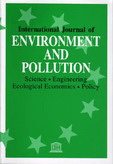
INTERNATIONAL JOURNAL OF ENVIRONMENT AND POLLUTION
Scope & Guideline
Advancing Environmental Insights for a Sustainable Future
Introduction
Aims and Scopes
- Environmental Quality Assessment:
The journal emphasizes methodologies for assessing various environmental parameters, including air and water quality, soil contamination, and waste management practices. - Pollution Control Technologies:
Research on advanced technologies and strategies for pollution reduction and management, including bioremediation, photocatalytic degradation, and innovative waste treatment processes. - Sustainability and Resource Management:
Focus on sustainable practices in land use, agricultural resource management, and the integration of environmental sustainability into economic activities. - Impact of Climate Change:
Investigations into how climate change affects environmental quality and resource availability, along with strategies for mitigation and adaptation. - Interdisciplinary Approaches:
Encouragement of interdisciplinary research that combines environmental science, economics, policy-making, and technology to address complex environmental challenges.
Trending and Emerging
- Impact of COVID-19 on Environmental Quality:
There is a growing trend in research assessing how the COVID-19 pandemic has influenced air and water quality, highlighting the relationship between human activity and environmental health. - Advanced Modelling Techniques:
The use of sophisticated modelling approaches, such as deep learning and LSTM models for predicting environmental parameters, is increasingly prevalent, showcasing technological advancements in environmental research. - Microplastic Pollution Studies:
Research focusing on microplastic contamination is emerging as a significant area of concern, reflecting global awareness of plastic pollution’s ecological impacts. - Synergistic Governance in Pollution Management:
The concept of collaborative governance and its effectiveness in managing urban environmental pollution is gaining traction, indicating a shift towards integrated approaches in policy-making. - Ecological Risk Assessment:
There is a notable increase in studies assessing ecological risks associated with pollutants, particularly heavy metals and other contaminants, emphasizing the importance of understanding long-term environmental impacts.
Declining or Waning
- Traditional Waste Management Techniques:
Research that focuses solely on conventional waste management methods is diminishing, as newer, more innovative approaches gain attention. - Basic Pollution Monitoring Studies:
Studies that merely monitor pollution without proposing actionable solutions or technological advancements are becoming less common, indicating a shift towards more applied research. - Generalized Environmental Education:
Papers focusing broadly on environmental education without specific applications or outcomes are on the decline, suggesting a move towards more targeted and impactful educational strategies. - Single-Country Case Studies:
There is a noticeable reduction in studies that focus exclusively on environmental issues within a single country, reflecting a growing interest in comparative and global analyses. - Niche Environmental Issues:
Research on very specific or niche environmental problems that do not have widespread relevance is decreasing, as the journal seeks to prioritize broader, more impactful themes.
Similar Journals

International Journal of Environmental Science and Technology
Advancing solutions for a sustainable future.International Journal of Environmental Science and Technology, published by SPRINGER, stands as a premier platform for the dissemination of cutting-edge research in the fields of environmental science, technology, and engineering. With an impressive scope spanning from 2005 to 2024, this journal serves as a vital resource for academic and professional communities engaged in tackling pressing environmental challenges. It boasts a strong reputation, evidenced by its Q1 ranking in Agricultural and Biological Sciences and solid placements in Environmental Chemistry and Engineering. Researchers searching for high-impact studies will find the journal's contributions significant, as reflected in its rankings within Scopus: 34th percentile in Agricultural and Biological Sciences and notable standings in Environmental Engineering and Chemistry. Although the journal is not currently an Open Access resource, it maintains a commitment to academic rigor and innovation, making it indispensable for those devoted to advancing knowledge in environmental sustainability and technology.
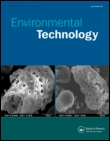
ENVIRONMENTAL TECHNOLOGY
Advancing Sustainable Solutions for a Greener TomorrowENVIRONMENTAL TECHNOLOGY, published by Taylor & Francis Ltd, is a prominent journal that serves as a crucial platform for disseminating pioneering research in the multifaceted fields of Environmental Science, Water Science and Technology, and Waste Management. With an impressive record spanning over three decades from 1990 to 2024, the journal holds significant rankings in various categories, including Q3 in Environmental Chemistry and Q2 in both Medicine (miscellaneous) and Water Science and Technology for 2023. Its Scopus rankings further position it within the top tiers of Environmental Science disciplines, reflecting its influence and relevance, particularly as it pertains to pressing global environmental challenges. While the journal does not offer an open access option, it remains dedicated to advancing knowledge and promoting innovative solutions among researchers, professionals, and students engaged in environmental studies. As it continues to attract high-quality submissions, ENVIRONMENTAL TECHNOLOGY plays a vital role in shaping future research and practices aimed at sustainable environmental management.
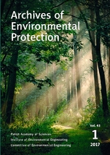
Archives of Environmental Protection
Pioneering Environmental Science for Global ImpactArchives of Environmental Protection, published by the Polish Academy of Sciences, is a pivotal journal in the field of Environmental Science. With an ISSN of 2083-4772 and E-ISSN of 2083-4810, this journal serves as a critical platform for disseminating innovative research and comprehensive reviews that address the complexities surrounding environmental issues. As of 2023, it holds a respectable Q3 ranking in Environmental Science, reflecting its relevance and contribution to the academic community, indicated by a Scopus rank of 124 out of 233 in the General Environmental Science category. Although it operates without Open Access, the journal's consistent publication from 2007 to 2024 emphasizes its commitment to advancing knowledge in diverse areas of environmental protection. Researchers, professionals, and students are encouraged to engage deeply with the wealth of insights offered through the rigorous peer-reviewed articles presented in this journal, which strive to foster sustainable practices and environmental stewardship.
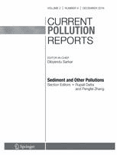
Current Pollution Reports
Illuminating the Path to Pollution MitigationCurrent Pollution Reports, published by Springer Heidelberg, is an esteemed journal in the field of environmental science, focusing on the multifaceted aspects of pollution, waste management, and water science. With an impressive 2023 impact factor reflected in its status as a Q1 journal across multiple categories—including Management, Monitoring, Policy and Law, Pollution, Waste Management and Disposal, and Water Science and Technology—this journal stands at the forefront of environmental research and policy discourse. The journal, which has been in publication since 2015, aims to provide a platform for scholars and practitioners to share their findings, promoting the exchange of innovative ideas and effective solutions to pressing environmental challenges. With its rigorous peer-review process, Current Pollution Reports serves as an invaluable resource for researchers, professionals, and students committed to understanding and addressing pollution and its impacts on our planet.
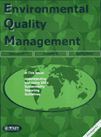
ENVIRONMENTAL QUALITY MANAGEMENT
Pioneering Solutions for Sustainable ManagementENVIRONMENTAL QUALITY MANAGEMENT is a respected journal published by WILEY, focusing on interdisciplinary studies that merge environmental science with public health, management, policy, and law. Since its inception in 1991, this journal has provided a platform for researchers and practitioners to share innovative insights and advancements in understanding environmental quality and its impacts on human health and the ecosystem. With an ISSN of 1088-1913 and an E-ISSN of 1520-6483, it holds a significant position in the academic community, evidenced by its presence in the Q3 quartile across several categories, including Management, Monitoring, Policy and Law, as well as Pollution and Waste Management. Although it is not an open-access journal, it continues to be a vital resource for those in the environmental sector, offering robust evaluations and discussions that advance knowledge and foster improved practices. With Scopus rankings demonstrating its relevance among other titles in the field, ENVIRONMENTAL QUALITY MANAGEMENT plays a crucial role in shaping discourse and informing policy in an increasingly vital area of study.
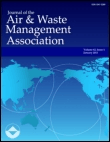
JOURNAL OF THE AIR & WASTE MANAGEMENT ASSOCIATION
Transforming Knowledge into Action for Environmental ExcellenceJOURNAL OF THE AIR & WASTE MANAGEMENT ASSOCIATION is a leading publication in the fields of environmental science, pollution control, and waste management, published by Taylor & Francis Inc in the United Kingdom. With an impressive history of publication dating back to 1989 and a commitment to advancing knowledge and practice in these critical areas, this journal serves as a valuable resource for researchers, professionals, and students alike. It holds a 2023 impact factor reflected through its competitive rankings in four distinct categories: Q3 in Atmospheric Science and Q2 in Management, Monitoring, Policy and Law, Pollution, and Waste Management and Disposal. The journal's dedication to disseminating innovative research and best practices plays a vital role in enhancing environmental policies and strategies globally. Although not currently Open Access, the journal is accessible through its ISSN 1096-2247 and E-ISSN 2162-2906, providing opportunities for rich academic discussion and collaboration in addressing pressing environmental challenges.

ENVIRONMENTAL ENGINEERING SCIENCE
Leading the charge in pollution control and waste management.ENVIRONMENTAL ENGINEERING SCIENCE is a leading journal published by MARY ANN LIEBERT, INC that provides a platform for pioneering research in the fields of environmental chemistry, pollution control, and waste management. With an ISSN of 1092-8758 and an E-ISSN of 1557-9018, this peer-reviewed journal aims to disseminate high-quality scientific studies that address critical environmental challenges. As evidenced by its 2023 category quartile rankings, it holds a notable position at Q3 in Environmental Chemistry and Pollution and Q2 in Waste Management and Disposal, highlighting its relevance and impact in these domains. Spanning over two decades from 1997 to 2024, the journal is dedicated to fostering innovations and promoting rigorous scholarship that can contribute significantly to sustainable environmental practices globally. Authors and researchers are encouraged to engage with this essential resource, which offers Open Access options to enhance the visibility and reach of their work. For those interested in advancing their understanding and practice within the environmental sciences, ENVIRONMENTAL ENGINEERING SCIENCE is an indispensable journal to consider.

Environmental Sciences Europe
Exploring innovative pathways to environmental resilience.Environmental Sciences Europe is a leading peer-reviewed journal published by SPRINGER, dedicated to advancing research in the field of environmental science, with a specific focus on pollution and its mitigation. Since its transition to Open Access in 2011, the journal has been committed to disseminating high-quality research without barriers, thereby ensuring that critical knowledge is freely accessible to researchers, practitioners, and policymakers around the globe. Based in Germany and with a commendable Q1 ranking in Pollution for 2023, the journal stands out in the Scopus rankings, occupying the 23rd position out of 167 in its category, reflecting its significant impact in shaping environmental discourse. With a convergence of global research efforts projected until 2024, Environmental Sciences Europe aims to provide a vital platform for scholarly communication and collaboration, ultimately contributing to sustainable solutions for pressing environmental challenges.

Rocznik Ochrona Srodowiska
Catalyzing Sustainable Practices through Rigorous ResearchRocznik Ochrona Srodowiska, published by the Middle Pomeranian Scientific Society for Environmental Protection, is an esteemed journal dedicated to advancing the field of environmental science in Poland and beyond. With an ISSN of 1506-218X, this peer-reviewed journal has established itself as a vital resource since its inception in 2007, addressing various environmental issues and promoting sustainable practices. Currently holding a Q3 category ranking in the Environmental Science (miscellaneous) field for 2023, it places itself in the 23rd percentile of Scopus rankings, reflecting a growing influence in the broader environmental research community. While the journal is not open access, it serves as an important conduit for researchers, professionals, and students to disseminate their findings and contribute to the interdisciplinary dialogue aimed at tackling pressing environmental challenges. With a commitment to rigorous research and practical applications, Rocznik Ochrona Srodowiska remains an essential platform for fostering innovation and collaboration in environmental studies.

Pollution
Exploring the depths of pollution research.Pollution is a distinguished open-access journal published by UNIV TEHRAN, dedicated to advancing the understanding of environmental science and the multifaceted aspects of pollution research. Since its establishment in 2015, the journal has been committed to disseminating high-quality, peer-reviewed articles that address the pressing issues of environmental degradation globally. With an impact factor and a Scopus rank that places it within the top tier of Environmental Science (Rank #141/233), Pollution serves as an essential resource for researchers, professionals, and students alike. The journal encompasses a wide range of topics, including the sources, effects, and mitigation strategies related to various forms of pollution, thereby aiming to contribute significantly to the scientific community's efforts in promoting environmental sustainability. Its innovative and timely approach positions Pollution as a vital platform for sharing knowledge and fostering interdisciplinary collaboration in the environmental science domain.